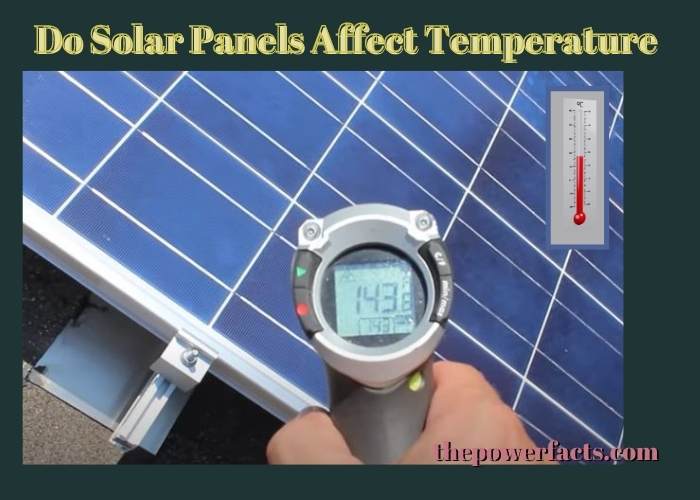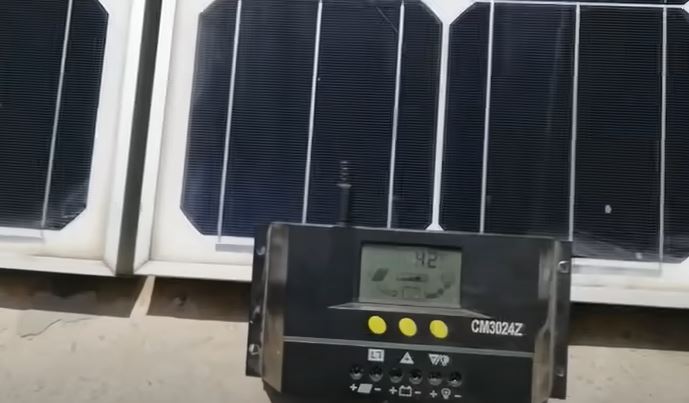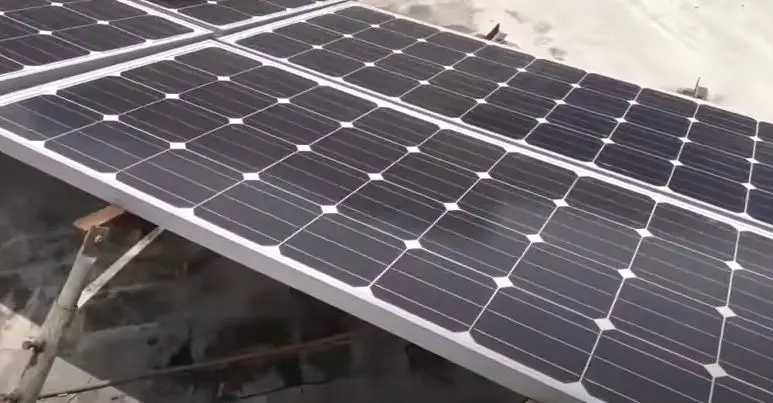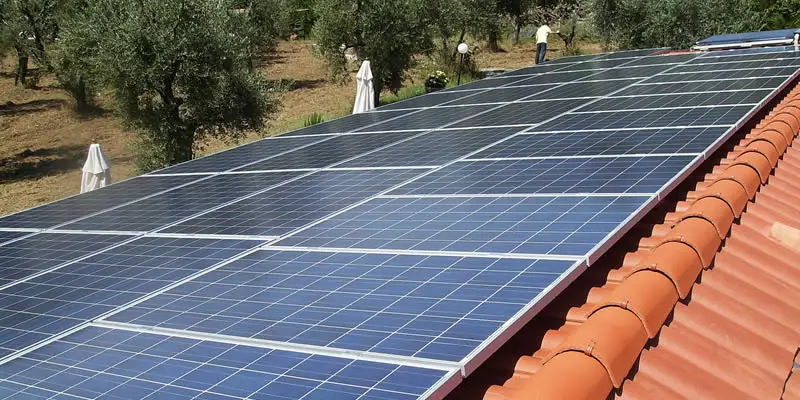Solar panels are installed in many homes and businesses as an alternative energy source. Solar panels work by converting sunlight into electrical energy. The solar panel produces direct current (DC) electricity which is then converted to alternating current (AC) electricity by the inverter.

The AC electricity is then used to power the home or business. Many people are concerned that the installation of solar panels will increase the temperature of their home or business. Also concern about getting solar permit.
What Effect Does Temperature Have on Solar Panels?
The jury is still out on whether or not solar panels have a significant effect on temperature. Some studies show that they can actually help to cool down the surrounding area, while other studies show that they may have a small heating effect. However, the overall consensus seems to be that solar panels have a very small impact on temperature, one way or the other.
So if you’re wondering if you should install solar panels to help keep your home cool in the summer or warm in the winter, the answer is probably “no.” But hey, every little bit helps, right?
Do Solar Panels Decrease Temperature?
Solar panels are a great way to reduce your energy consumption and save money on your electric bill. However, solar panels can also help to decrease the temperature of your home. This is because solar panels absorb heat from the sun and convert it into electricity.
This process helps to cool the air around the solar panel, which can help to reduce the overall temperature of your home. Additionally, solar panels can help to shade your home from direct sunlight, which can also help to keep your home cooler during hot summer months.
At What Temperature are Solar Panels Most Efficient?

Solar panels are most efficient at lower temperatures. This is because the silicon in solar panels has a higher conductivity at lower temperatures, which means that more photons from the sun can be converted into electricity. The ideal temperature for solar panel efficiency is around 25 degrees Celsius (77 degrees Fahrenheit).
However, solar panels will still work at higher temperatures, although their efficiency will decrease.
What is the Maximum Temperature a Solar Panel Can Withstand?
The solar panel is a vital part of the solar power system. It is responsible for converting sunlight into electricity. The solar panel is made up of many silicon cells that are connected together.
When sunlight hits the silicon cells, it causes an electric current to flow through the cell. This electric current is then converted into usable electricity by the solar panel.
The maximum temperature that a solar panel can withstand before it begins to degrade is about 85 degrees Celsius (185 degrees Fahrenheit).
However, most panels are designed to operate at temperatures below 80 degrees Celsius (176 degrees Fahrenheit). If the temperature of the panel exceeds this threshold, it will begin to experience reduced power output and eventually fail entirely.
It’s important to keep your solar panel cool in order to prevent damage and maintain optimal performance.
If you live in an area with high temperatures, consider installing a shading device or fan over your panels to help keep them cool.
How Hot Do Solar Panels Get?

Solar panels are designed to absorb sunlight and convert it into electricity. But how do they work? And how hot do they get?
Solar panels are made up of photovoltaic cells, which are made of silicon. When sunlight hits the silicon, it knocks electrons loose from their atoms. These free-flowing electrons create an electric field.
Metal conductors on the front and back of the cell collect these electrons and direct them into an electrical circuit. The more light that hits the solar panel, the more electricity is produced. But all that sunlight can make a solar panel pretty hot!
In fact, on a sunny day, a solar panel can reach temperatures upwards of 150 degrees Fahrenheit (65 degrees Celsius). That’s why solar panels usually have built-in fans or cooling systems to keep them operating at peak efficiency. Despite their high temperatures, solar panels are actually quite safe.
The materials they’re made of—silicon, metal, glass—can all withstand high temperatures without breaking down. And because solar panels don’t use any toxic chemicals or volatile liquids in their operation, there’s no risk of fire or pollution if they overheat.
Minimum Temperature for Solar Panels
As the weather gets colder, you may be wondering if your solar panels will still work. The good news is that solar panels can actually operate in cold weather! However, there is a minimum temperature that they need to function properly.
Solar panels are made up of silicon cells that generate electricity when exposed to sunlight. When it’s cold outside, the sun’s rays are not as strong and don’t provide as much energy to the cells. As a result, the cells produce less electricity.
The minimum temperature for solar panels to work is around 32 degrees Fahrenheit. This is because the silicon cells need to be above a certain temperature in order to create an electrical current. Below this temperature, the cells simply won’t work.
So if you’re worried about your solar panels during a cold snap, don’t be! As long as the temperatures are above freezing, they should be just fine.
Effect of Temperature on Solar Cell Efficiency
The average efficiency of a solar cell declines as the temperature of the cell increases. The reason for this is that when a solar cell gets hot, the electrons in the semiconductor material become more excited and start to move around more quickly. This causes them to collide with the atoms in the material, which slows down their flow and reduces the overall efficiency of the cell.
There are two main types of solar cells: crystalline silicon cells and thin-film cells.
| Crystalline silicon cells | Silicon cells and thin-film cells |
| Crystalline silicon cells are made of single crystal or polycrystalline silicon | Thin-film cells are made from layers of amorphous silicon or other materials such as cadmium telluride. |
| Crystalline silicon cells are more affected than thin-film cells. | thin-film cells are less affected than crystalline silicon cells |
| The efficiency of a crystalline silicon cell can drop by as much as 20% when it gets too hot | A thin-film cell may only lose about 10% under the same conditions. |
| Passivation layers can increase the overall efficiency of a crystalline silicon solar cell by up to 5%. | They don’t work as well on thin-film cells since these types of solarcells already have good heat-resistant properties. |
Why Does Solar Cell Efficiency Decreases With Temperature?

Solar cell efficiency typically decreases with increasing temperature. There are a number of reasons for this. One is that the band gap of a material generally increases with temperature.
This means that, at higher temperatures, it becomes increasingly difficult to generate an electron-hole pair (i.e., to create an excited state). As a result, solar cells are less likely to absorb photons and convert them into electrical energy.
Another reason why solar cell efficiency decreases with temperature is due to thermalization.
Thermalization is the process by which an excited state relaxes back to its ground state. In other words, it is the process by which energy is dissipated as heat. Solar cells rely on keeping electrons in their excited states so that they can be transported across the cell and ultimately converted into electrical current.
However, at higher temperatures, thermalization occurs more quickly and aggressively, leading to a loss of excited electrons and a decrease in solar cell efficiency.
Do Solar Panels Increase Temperature of House?
Solar panels do not increase the temperature of a house. In fact, they can actually help keep a house cooler in the summer by shading the windows and reflecting heat away from the building.
Does Temperature Have an Effect on Solar Panels?
As the weather gets warmer, people tend to flock outdoors to enjoy the sun. But does temperature have an effect on solar panels? The answer is yes!
Solar panels are designed to absorb sunlight and convert it into electricity. When it’s cold outside, the sun’s rays are not as strong, so solar panels aren’t able to absorb as much light. This means that they won’t be able to produce as much electricity.
So if you live in a cold climate, you might want to consider installing your solar panels in a place where they can get direct sunlight even when it’s cold outside.
FAQs
Do Solar Panels Make It Colder?
No, solar panels do not make it colder. In fact, they can actually help to heat your home by absorbing sunlight and converting it into energy.
At What Temperature Do Solar Panels Stop Working?
Solar panels are designed to withstand a wide range of temperatures, from -40 degrees Fahrenheit to +158 degrees Fahrenheit. However, the efficiency of solar panels starts to decrease at around 95 degrees Fahrenheit. So while solar panels will still work in extremely hot conditions, they won’t be working as efficiently as possible.
Conclusion
Solar panels are said to have a cooling effect on the temperature of your home. This is because they absorb heat from the sun and release it into the air, which helps to keep your home cool. However, there is no definitive answer as to whether or not solar panels actually do affect the temperature of your home.
Some studies have shown that they can help to lower the temperature by a few degrees, while other studies have shown no significant difference. Ultimately, it is up to you to decide whether or not you think solar panels will help to cool your home.